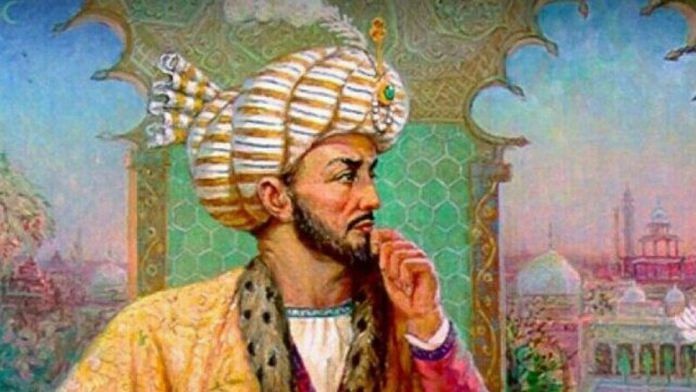In ad 1488, Aisha Sult̤ān Begum1 was engaged to Babur in Samarkand. Babur was just six years old then. She was the daughter of his paternal uncle Sult̤ān Ahmad Mīrzā and his mother’s sister, Qutaq Begum. Sult̤ān Ahmad Mīrzā arrived in Andijān with his daughter Aisha sometime in the first quarter of ad 1500. She was married to Babur in the month of Shaban.
Babur has given an account (in the Baburnama) of how he was a shy person. And it is even more interesting that he has blamed the shyness on the fact that it was his first marriage. His assertion of ‘first marriage’ makes one believe that he was foreseeing more marriages, which was an obvious trait of the society he belonged to. Because of his shyness and modesty (as Babur has claimed in the Baburnama), he visited her only once every two or three weeks. But it was not very late when he stopped with those bimonthly visits too.
Babur has written in the Baburnama that he had begun to lose inclination and attraction for Aisha Sult̤ān Begum. And then Babur’s mother Khānum intervened as she was not at all happy with her son’s actions. Upon his mother’s insistence, Babur resumed his visits to Aisha but only once every seven weeks or so. Babur’s writings make us believe that something was wrong in his marriage with Aisha. What was it? Perhaps, Babur was bisexual and was more inclined towards men than women, at least in that period. Babur does mention that in those leisurely days, he had discovered a strange inclination in himself. He writes:
I maddened and afflicted myself for a boy in the camp bazar, his very name, Baburi, fitting in. Up till then, I had had no inclination for anyone, indeed of love and desire, either by hear-say or experience, I had not heard, I had not talked.
Relating to the situation he composed the following verse originally in Persian:
May none be as I, humbled and wretched and love-sick. No beloved as thou art to me, cruel and careless.
Perhaps this was composed for his newly found love in the young lad, Baburi. And in this new tourney of affair and friendship, Baburi had begun to visit Babur often. Yet again, modest, and bashful (as asserted by Babur himself in the Baburnama) Babur couldn’t look straight into his eyes. He was hesitant to even strike up a conversation with him. And every time, he would return, Babur could never thank him and would wonder how again he would address him.
Baburi’s presence always filled him with joy but being unable to talk brought agitation too. He always wondered what power he had to command the duty of service to himself. Babur has narrated a very interesting incident. Once, filled with desire and passion, when he was walking along a lane of town with his companions, he bumped into Baburi. He could not decide what to do next and in a state of confusion, he almost went right off without uttering a single word. Babur found it impossible to even look straight at him, forget uttering a word.
Filled with shyness and shame, Babur recalled a Persian couplet by Muhammad Salih in his mind:
I am abashed with shame when I see my friend; My companions look at me, I look the other way.
Indeed, that couplet went well with Babur’s situation. In Babur’s words, entangled in that frothing desire and passion, under that stress of youthful folly, he used to wander, bare-headed, bare-foot, through streets and lanes, orchards and vineyards. As all this proceeded, he cared to show civility neither to his friend nor the stranger.
He was completely carefree, not thinking either of himself or others around him. In the context of the very situation, Babur composed yet another couplet in Turkic whose translation reads as below:
Out of myself, desire rushed me, unknowing, that this is so with the lover of a fairy-face.
Babur asserts that he had turned crazy. He used to wander over hills and plains like a madman. Sometimes, he roamed crazily in gardens, suburbs and lanes one by one. He was not being nomadic by choice, but as he has mentioned, it was the time that was making him do so. Although he wandered extensively, he did not at all know where is he going to be put up.
He composed a Turkic couplet describing the situation he was in:
Nor power to go was mine, nor power to stay; I was just what you made me, o thief of my heart.
 This excerpt from ‘Babur: The Chessboard King’, has been published with permission from Penguin Random House India.
This excerpt from ‘Babur: The Chessboard King’, has been published with permission from Penguin Random House India.




Good post